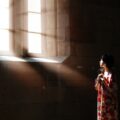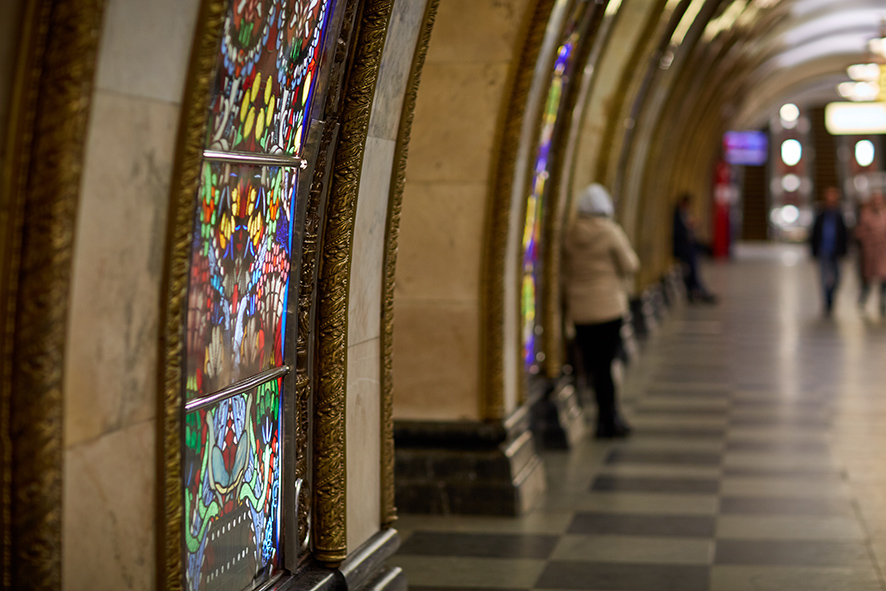Prioritising radical love in the Church with Alix Bayle
Prioritising radical love in the Church with Alix Bayle
In this series, we are becoming acquainted with Catholic women who took their place in the Catholic Church. We are learning from the ways they succeeded in voicing their truths, even in a male-dominated environment.
Alix Bayle envisions a Church that practices radical love. As a feminist Catholic, how does she work towards this goal?
Alix Bayle is a French journalist and documentary film director. She envisions a non-patriarchal Church where everyone is safe and valued. In order to make this happen, Bayle takes multiple initiatives.
On the one hand, she co-founded the collective Toutes Apôtres ! (All Women Apostles) with women who applied for leadership positions in the Catholic Church.[1] Together, the collective holds the Catholic Church accountable on matters such as sexual violence and gender justice.
After the CIASE commission publicised the number of 330,000 children sexually abused by Catholic representatives in France over the last 50 years, the collective indeed advocated for reforms. Also, Toutes Apôtres ! requested the creation of an independent commission on the situation of women in the Church.
On the other hand, Bayle stands up for causes that matter to her personally. In July 2021, she took charge of the communication for the first lesbian pastors’ wedding ceremony in France.[2] Later, in September 2022, Bayle wrote an opinion piece in La Croix. There, she argues that “the Catholic Church cannot welcome [women and LGBT+ people ] with one hand and oppress them with the other.”[3]
At heart, Bayle is one of the Catholic feminists who “are saving the Church from itself,” as sociologist Josselin Tricou writes.[4] In this interview for EARS, she shares more on her motives and strategies.
What led you to co-create the collective Toutes Apôtres !?
Becoming a mother made me a feminist. Motherhood was like a ‘reality check’. I experienced gender inequality in my relationship and in my career. Learning about feminism was useful in politicising this experience. With psychotherapy, it helped me understand the role of the Church in my journey as a woman.
As it turns out, as a journalist, I can grow my personal obsessions into professional ones. I reached out to female theologian Anne Soupa and later, when she applied to become a bishop in Lyon, I was already in touch with her![5] So I asked her: “How can I help you?” – and with some fellow Catholic feminists, we launched Toutes Apôtres !.
Do you think your collective is being heard in the Catholic Church?
It is being heard. The question is: is it being listened to?
Toutes Apôtres ! first took action in July 2020, by publicising the applications of seven women to positions in the Catholic Church.[6] A French bishop reacted on social media by scolding a Christian radio network that relayed this information, arguing that we were producing agitprop.[7]
This tells me that our methods are effective: we are heard, we are visible, and we know how the media works. In fact, we got some exposure in the French and international media, which is extraordinary for Catholic feminist actions. Even if French Catholic officials did not want to hear what we had to say, they were forced to.
However, are there female priests nowadays? Is there a debate over the ordination of female priests? The answer is no, not yet. On the contrary, Pope Francis confirmed that there would be penalties for anyone who helps women who claim they have a vocation to priesthood. This is paradoxical because there is a growing consensus among Catholics that the Church needs to work towards gender equality.
However, Catholics who advocate for male-female equality rarely include LBGTQ+ people. To balance this, I feel that I need to contribute to the discussion.
Do you mean that the emancipation of LGBTQ+ people of faith could benefit gender equality in the Catholic Church?
In society at large, one cannot hope to improve male-female equality without improving the situation of LGBTQ+ people. Let me take an example. As a consequence of the debate over the participation of trans people in sports, cisgender heterosexual women are asked to prove their femininity. This goes to show that protecting trans people is essential in securing male-female equality. In both cases, we look to avoid defining femininity and masculinity in excluding ways.
I insist that this also applies to religions. When we exclude LGBTQ+ people under the pretence that women must be like Eve and men must be like Adam, we restrict people to idealised roles. Acknowledging the diversity of people’s vocations first requires having a much less strict definition of manhood and womanhood. Subsequently, LGBTQ+ issues and gender equality issues are interdependent.
I feel that lots of Catholic feminists carry the taboos of homosexuality and transidentity on. We all grew up with these taboos. But I want to tell them that if they want their own emancipation to be complete, they need to address such taboos.
What are your strategies to get your message across?
There are various methods I think are essential to succeeding in being heard, as a woman in the Catholic Church.
First of all, mobilising in groups. I do not believe one can fight alone. Advocating for women in Catholicism is too conflictive for me to do it on my own. It is extremely important to me that we work together, since we all have our biases. I understand feminism to be a liberation for us all, collectively. Also, I find it prophetic that we promote, in our activist groups, the Church that we want.
Soupa’s application to the archbishopric in Lyon was a strong message. But it became much stronger after seven other women followed her lead and applied for multiple positions in the Church. It showed that Soupa’s application was the beginning of a profound movement. It mobilised a diversity of women of all ages, professions, gender identities, et cetera.
Second of all, reaching out to the media. As a journalist, I spontaneously went for media coverage. I had previous experience in public communication, because I had co-created the collective PA.F “for a feminist parenthood.”[8] Also, I had been a correspondent in London for French television. There, I used to receive many press releases from different organisations and I learned what makes journalists want to look into a topic.
On another note, the support of the secular media makes a huge difference. The French society at large is ready for a change in the Catholic Church. I think that people are not insensitive to the spiritual and cultural legacy of the Catholic Church but still, they do not understand why the Church still refuses to make equality between men and women a reality. Consequently, French journalists are often relieved and happy that Catholics are speaking up against abuse. They listen to Catholic feminists rather attentively.
Third of all, not being concerned about conflictuality. Indeed, what usually prevents initiatives in the Catholic Church is the fear of conflict. We went beyond that. For a long time, Catholic feminists have tried to remain ‘in dialogue’ with the Church, to the point of exhaustion. The vast majority of them ended up leaving the Church. We have no other choice but to confront its patriarchal reality.
The conflict is already there anyway. It is always the more powerful people who determine what is to be considered an aggression and what is not: the status quo is currently violent to women and LGBTQ+ people, but it is considered peaceful by the Church at large.
Today, we understand that if we want to remain in the Church, we have no other choice but to face the Church with its own reflection. Of course, people feel that we are threatening and violent; this is what abuse looks like in the mirror.
And finally, learning from one another. Catholic feminists are made to feel very lonely. It is hard for feminists to learn from their predecessors. Yet, there were thousands of women, in the history of the Church, who have raised their voices before us. Plus, we should be aware that we are such a small minority that we do not afford the luxury of being divided. We need to dare being in dialogue with one another.
If you had something to tell Catholic women or women of all religions, what would it be?
What moves me is the faith that I am loved. I am obviously loved by my friends and family. But the love that Christ promised to us is also given to me. Christ loves me, not in the conditional way that my Church loves me, but in an unconditional way.
I warmly invite women to listen to this voice, which is at the heart of any kind of prayer. Everything comes from there. You see, if I am unconditionally loved, then I do not deserve the abuse of the Church. My anger and my resilience are all justified by this love.
How do you experience your religious and political commitment? How does it inform your faith?
I believe that I am Catholic because I am feminist, and I am feminist because I am Catholic. Being a feminist – that is fighting for equality for all – comes from receiving the commandment of radical love. Understanding what this commandment means and how to put it into practice is the pursuit of a lifetime – and personally, feminism helped on this journey.
Being a Catholic comes from being called to a collective liberation of all. As a woman who lives under patriarchy, acknowledging oppression systems taught me to have empathy towards myself and others. Feminism has made me much more open and sensitive to the situations of people who are different from me; I feel this makes me a better Christian and helps me get closer to my baptismal vocation.
Want to read more about similar topics? Go to the EARS Dashboard.
Sources
[2] L’Eglise protestante bénit le premier mariage de pasteures lesbiennes.
[3] Femmes et LGBT + : « L’Église ne peut oppresser d’une main et accueillir de l’autre »
[4] « Le féminisme est en train de sauver l’Église d’elle-même et malgré elle » tribune Josselin Tricou
[5] Une femme candidate pour succéder au cardinal Barbarin comme évêque de Lyon
[6] Sept femmes candidates à des fonctions qui leur sont interdites dans l’Eglise catholique





